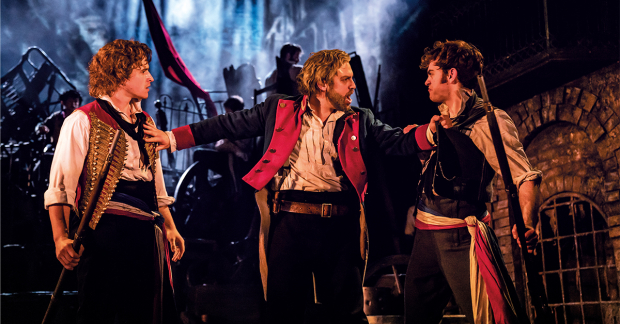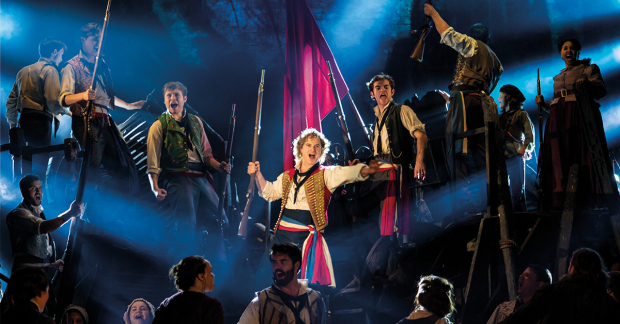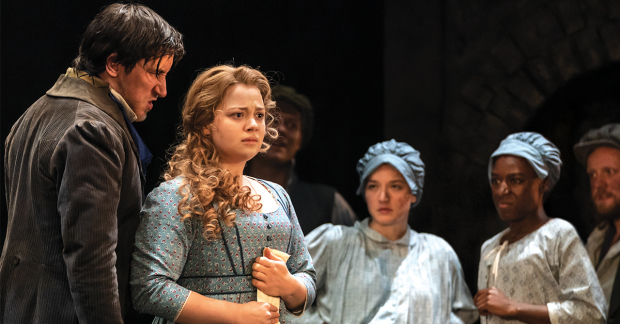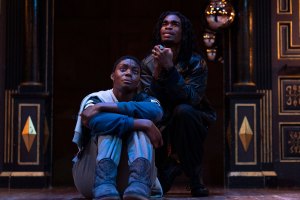Did critics give Les Misérables stars in their multitudes?
The world’s longest-running musical becomes master of the house at the newly refurbished Sondheim Theatre

© Johan Persson
Sarah Crompton, WhatsOnStage
★★★★
"People love Les Mis with a passion and I can see why. It is beautifully made. The adapters brilliantly punctuate its bustling, hectic crowd scenes of France in the years around the time of the 1832 uprising when barricades blocked the streets of Paris, with the tragic story of Jean Valjean, a former prisoner who has served 19 years hard labour for stealing a loaf of bread, and whose attempts to live a good life are dogged by the pursuit of the steely policeman Javert, who believes in law not justice.
"Each character has moments of monologue and introspection, their revelatory solos contrasting with the rousing ensemble pieces that surround them. The swift changes of focus power the show, moving it along briskly.
"It's all very efficient and sharp. At its heart is Jon Robyns as a big-voiced and tender-hearted Valjean, catching the character's tortured valour and bringing gentle passion to the quiet "Bring Him Home", as well as boom to the bigger numbers."

© Johan Persson
Miriam Gillinson, The Guardian
★★★★★
"This new version is less showy than the original; no longer a spectacle to lean back and admire but, instead, something more truthful and, ultimately, more moving. The battles, the poverty, the degradation and the danger: all feel more relevant and real."
"For all the poetic power of the staging, it's the singing we've come for – and there's not a missed note all night. Schönberg's soaring score sweeps the audience away. Robyns mesmerises as Valjean, the ex-prisoner who cannot outrun his fate. His voice has great depth, strength and tenderness. When Valjean sits among the barricades and sings that most delicate of songs, "Bring Him Home", the theatre holds its breath."
"Matt Kinley's nimble set transforms from bustling life to aching loneliness in an instant and features looming projections, based on paintings by Victor Hugo (whose epic novel inspired the show). They're beautiful and haunting vistas, which offer the impression of 19th-century Paris but also might be anytime, anywhere."
Dominic Cavendish, The Telegraph
★★★★★
"As dogged as the remorseless police inspector Javert in Victor Hugo's 1862 masterpiece, and as devoted to doing good as the (reformed ex-con) hero Jean Valjean, Mackintosh – who had a crucial shaping hand in developing Les Misérables in the first place alongside composer Claude-Michel Schönberg and lyricist Alain Boublil and has closely supervised this architectural project too – deserves his own round of grateful applause.
"Assisted by a cluster of terrific lead performances – Robyns commandingly robust as Jean Valjean, Bradley Jaden gloweringly good as Javert, Shan Ako sensational as Eponine – London's longest-running musical has seldom looked, or sounded, so fresh.
"In other words, some 35 years after it received its premiere (critics, sniffy at the time, have been forced to eat gateau d'humilité ever since), Les Misérables, bolstered in its urgency by topical tumult the world over, might once again be the hottest ticket in town."
Nick Curtis, Evening Standard
★★★★
"The through-sung score, with its tum-te-tum rhythms and recurring motifs, moves from rousing anthems to passionate, spotlit declarations of love and loss. As in Hamlet, almost everybody dies, and the few that survive have their dreams smashed. It's not my preferred cup of tea but it's supremely well done here.
"Carrie Hope Fletcher and Ako deliver show-stopping turns as helpless Fantine and luckless Eponine. Jaden sings up a storm but seems faintly comic as Valjean's nemesis Javert. Lily Kerhoas and Harry Apps do as well as they can as Cosette and Marius, whose only function is to fall dopily in love amid a massacre. Ian Hughes, drafted in after two other actors were injured, has a ball as the criminal innkeeper Thénardier."

© Johan Persson
Tim Bano, The Stage
★★★★
"Striking animations fill the back wall throughout, in the same smudged dark colours as Hugo's work. But what [Matt] Kinley has done, a really gorgeous effect realised by 59 Productions and Finn Ross, is have them morph constantly.
"Just as the revolve gave a sense of constant motion and momentum to the original, so the projections do here. They also vastly improve the scene transitions, particularly in a stomach-lurching descent to the sewers. Importantly, too, the set and projections work seamlessly with Paule Constable's lighting, which beautifully ranges from sewer dinginess to bright shafts of daylight through metal bars.
"Josefina Gabrielle, unrecognisable here, gives us a raucous, rasping Madame Thénardier, and props to Ian Hughes who had to jump in as Thénardier at the last minute when Matt Lucas had to withdraw, having jumped in when Gerard Carey had to withdraw. Hughes and Gabrielle tamper the more de trop tendencies of the Thénardiers, and prevent them from being too panto."
Andrzej Lukowski, Time Out
★★★★
"It famously 'defied the critics' who reviewed it when it opened in 1985, to become the longest-running West End musical in history. Whereas some long-runners are undeniably pretty bad (The Mousetrap is terrible, Mamma Mia! is only tolerable if you're drunk – these are facts), Les Mis has a towering passion and operatic intensity – not to mention absolutely belting tunes, in gorgeous multilayered vocal arrangements – that operate on a visceral, gut level.
"It whumps you in the solar plexus, especially when sold by the sort of world-class singers that Mackintosh rightly insists on keeping it stocked with. I think, maybe, where the original critics tried to dissect and analyse this sprawling epic, the original audiences just let it overwhelm them."
Aleks Sierz, The Arts Desk
★★★★
"As co-directed by James Powell and Laurence Connor, this version is extremely nimble, with rapid and seamless scene changes and propulsive storytelling. It also has a welcome darkness which dispels any traces of emotional saccharine. The most spectacular moments are the arrival of the barricades in a blaze of light and the ensuing and fearsome battle, which has searchlight effects reminiscent of world war one. Here Paule Constable's lighting is a thrilling accompaniment to the soaring romance of the music. Likewise, the grim scene on the bridge as Javert admits defeat is wonderfully realised. By contrast, the initial arrival of the tiny Cosette – dwarfed by her trademark broom – is beautifully sweet, while the simplicity of the tiny lights for the melancholy "Empty Chairs at Empty Tables" is suitably moving.
"The music, in all its pomp and glory, depends on good work from a mere 14 musicians, conducted by Steve Moss. The two main singers, Jaden's Javert and Robyns' Jean Valjean, are both fervent and soaring, while also giving their characters the necessary shades of psychological complexity to balance the more overt emotionality of some of the others. I think they deliver the key numbers – "Who Am I?" and "Soliloquy" – with exceptional power, and with a satisfying sense of the dramatic."




















